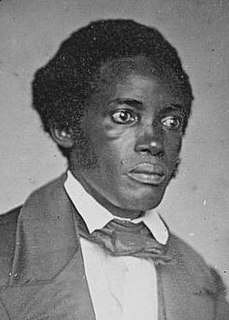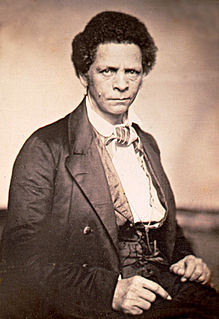
Politics of Liberia takes place in a framework of a presidential representative democratic republic modeled on the government of the United States, whereby the President is the head of state and head of government; unlike the United States, however, Liberia is a unitary state as opposed to a federation and has a pluriform multi-party system rather than the two-party system that characterizes US politics. Executive power is exercised by the government. Legislative power is vested in both the government and the two chambers of the legislature.

The President of the Republic of Liberia is the head of state and government of Liberia. The president serves as the leader of the executive branch and as commander-in-chief of the Armed Forces of Liberia.

John Hanson was an African American associated with the American Colonization Society, which sought to relocate black Americans to Liberia. In Liberia, he served as a senator from Grand Bassa County. He was born into slavery, but he purchased his freedom and emigrated from Baltimore to Liberia at age thirty-six. In Liberia, he joined the growing mercantile class. He was elected to the Colonial Council in December 1840, and was elected as one of the two senators from Grand Bassa county in the first elections after the country's independence. He also served as Commissary in the same county for several years, furnishing a house for the storage of arms and ammunition.

George Tawlon Manneh Oppong Ousman Weah is a Liberian politician and former professional football player currently serving as the 25th President of Liberia, in office since 2018. Prior to his election to the presidency, Weah served as Senator from Montserrado County. During his football career, he played as a striker. His prolific 18-year professional playing career ended in 2003.

Elections in Liberia occur solely at the national level. The head of state, the President of Liberia, is elected to a six-year term in a two-round system, in which a run-off between the two candidates with the highest number of votes is held should no single candidate earn a majority of the vote in the first round. The Legislature has two elected chambers.
The First Liberian Civil War was an internal conflict in Liberia from 1989 until 1997. The conflict killed about 250,000 people and eventually led to the involvement of the Economic Community of West African States (ECOWAS) and of the United Nations. The peace did not last long, and in 1999 the Second Liberian Civil War broke out.

Grand Bassa is a county in the west-central portion of the West African nation of Liberia. One of 15 counties that comprise the first-level of administrative division in the nation, it has eight districts. Buchanan serves as the capital with the area of the county measuring 7,936 square kilometres (3,064 sq mi). As of the 2008 Census, it had a population of 224,839, making it the fifth most populous county in Liberia.

Daniel Bashiel Warner served as the 3rd President of Liberia from 1864 to 1868. Prior to this, he served as the 5th Vice President of Liberia under President Stephen Allen Benson from 1860 to 1864, and as the 3rd Secretary of State in the cabinet of Joseph Jenkins Roberts from 1854 to 1856.

Ellen Johnson Sirleaf is a Liberian politician who served as the 24th President of Liberia from 2006 to 2018. Sirleaf was the first elected female head of state in Africa.

The Legislature of Liberia is the bicameral legislature of the government of Liberia. It consists of a Senate – the upper house, and a House of Representatives – the lower house, modeled after the United States Congress. Sessions are held at the Capitol Building in Monrovia. Legislature of Liberia is considered one of the three branches of government based on the Article III of the Constitution of Liberia that stipulates all three branches ought to be equal and coordinated based on the Principle of checks and balances.

The Senate is the upper house of the bicameral legislative branch of Liberia, and together with the House of Representatives comprises the Legislature of Liberia. Each of the fifteen counties are equally represented by two senators, elected to serve staggered nine-year terms. The Senate meets at the Capitol Building in Monrovia.

James Skivring Smith was a Liberian politician who served as the 6th President of Liberia from 1871 to 1872. Prior to this, he served as the 8th Vice President of Liberia from 1870 to 1871 under President Edward James Roye and as Secretary of State from 1856 to 1860 in the cabinet of President Stephen Allen Benson. He was a member of the True Whig Party.

Beverly Page Yates (1811–1883) was an American-Liberian politician who served as the Vice President of Liberia from 1856 to 1860 under President Stephen Allen Benson. Born in the United States, he emigrated to Liberia as a young man under the auspices of the American Colonization Society. Yates also served as an Associate Justice of the Supreme Court of Liberia and Judge of the Court of Quarter Sessions and Common Pleas for Montserrado County, Liberia.

Presidential elections were held in Liberia in 1857. The result was a victory for incumbent President Stephen Allen Benson.

Presidential elections were held in Liberia in 1859. The result was a victory for incumbent President Stephen Allen Benson.

Presidential elections were held in Liberia in 1861. The result was a victory for incumbent President Stephen Allen Benson.

General elections were held in Liberia on 10 October 2017 to elect the President and House of Representatives. No candidate won a majority in the first round of the presidential vote, so the top two finishers — CDC standard-bearer Amb. George Weah and UP standard-bearer Vice President Joseph Boakai — competed in a run-off on 26 December. The second round was originally scheduled for 7 November, but was postponed after LP standard-bearer Cllr. Charles Brumskine, in third place, challenged the result in the Supreme Court. The Supreme Court dismissed the challenge, which would have forced a re-run of the first round had it been successful, and the second round was held on 26 December. Weah emerged victorious with just over 60% of the vote.













